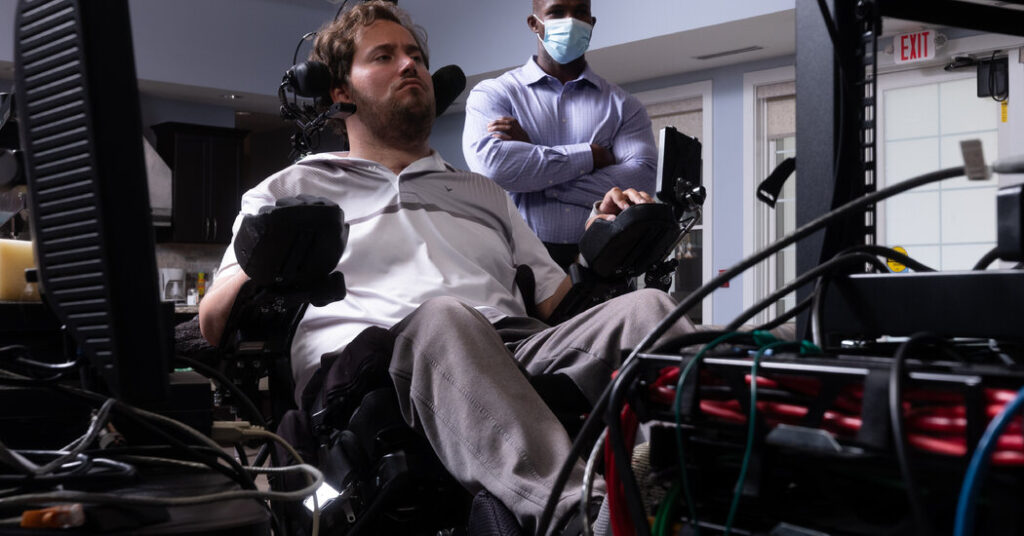Our brains are being bombarded by social media and algorithms designed to capture our attention. Now, with neural technology and A.I. advancing at breakneck speed, we face an even more radical prospect. Today I speak with my colleague Linda Kinstler about technology that can actually read our minds — and maybe even change them.
A brave new world?
My parents used to play a 19th century German folk song, “Die Gedanken Sind Frei,” which means “thoughts are free.”
No man can know them
No hunter shoot them
It will always be:
Thoughts are free
Concerns — and dreams — about controlling the human mind go back a long way, my colleague Linda Kinstler recounts in her must-read New York Times Magazine piece. During the Cold War, the first implants showing that we could control animal minds sparked panic about the Soviet Union using this technology to spread communism. The C.I.A. had its own clandestine experimental mind-control program. People warned of brain warfare.
Those fears have come and gone. But today they’re very much back, along with a conversation about what it means to have freedom of thought at a time when technology is literally being implanted in our brains.
Linda, what does that technology look like?
At the core of this technology is something called a brain computer interface, or B.C.I. These are very small devices that go right on the surface of your brain, where they can pick up neural activity. The data is transmitted via Bluetooth to a computer program, which decodes the information.
In a sense, they’re hooked up to an artificial intelligence. So the neural network inside your mind communicates with a neural network outside. And through that, we are able to reconstruct people’s intentions — what they would like to say, what they would like to do with their arms or hands, and so on.
And how is this technology currently being applied?
You might have heard of Neuralink, Elon Musk’s company, which has implanted 12 people so far with these devices. But there are many others.
The implants are geared toward what they call restoration of function. For people with degenerative diseases, or who are paralyzed, or who otherwise have lost important abilities, these implants have been totally revolutionary. These patients can move their hands, type and in some cases, speak again.
One patient I learned about was not only able to communicate, but also hear their own voice again. The algorithm used past recordings of his voice and then expressed his thoughts in his voice. Imagine if you hadn’t heard your father’s voice for that long and suddenly he “speaks” to you again.
That all sounds very sci-fi, but also incredibly promising. What are the concerns?
On the one hand, it’s wonderful that we have this technology. On the other hand, I can immediately think of one million ways this could be misused. These technologies can access what we’re used to thinking of as our most intimate selves — our minds, the substance of our thoughts. What kind of commercial purposes or political purposes could that be used for? These technologies are really pushing the thresholds of privacy.
That’s the problem lawyers and philosophers and ethicists are trying to think through: how we set guidelines when the technology is advancing at such a rapid pace and entering the market pretty swiftly.
Could this technology not just read our thoughts, but also alter them?
The short answer is no. The longer answer is: It’s complicated. “Thought,” as my sources reminded me, is not a technical term. There is a technique called deep brain stimulation that is used therapeutically to treat, for example, Parkinson’s. There was one reported instance where, in a clinical setting, they were performing deep brain stimulation, and it dramatically altered the behavior of the patient. When they stopped the procedure, he went back to normal. What it demonstrated was that if you’re manipulating someone’s brain, you can alter their actions.
Optogenetics, a technique for turning isolated neurons on and off, has been used to implant false memories in mice, raising the possibility that, in the distant future, something similar could be done in humans.
We’re very far away from the potential of that commercially. But scientifically, no one is saying that this isn’t at least theoretically possible.
Tell me a little bit about the idea of neuroprivacy.
Neuroprivacy is the idea that we should have to give consent to anyone who wants access to our innermost selves. But there’s a question: Does neuroprivacy apply only to my unspoken thoughts? Or does it apply to the electrical activity in my brain? If that’s the case, does it apply to what I type, what I click on? That’s intimate information that’s being harvested already. And all of these things are derived from neural activity. So it could be a really broad category of data or it could be quite small, but there is a consensus that we need to recognize this new kind of information.
What kind of safeguards can we impose? How are people and governments thinking about this?
In the United States, several states have passed laws about how neural data should be regulated. National legislation has been proposed that would require regulators to look into this. Countries outside of the United States — Chile, Spain and others — have discussed, and in some cases passed, neural privacy laws.
The good news is everyone I spoke to told me these conversations about the implications of these technologies are coming ahead of time. If you’re an able-bodied person, there’s currently no way that you could get one of these implants legally. If and when that does happen, however — an able-bodied person gets a neural implant — that will really mean we’ve crossed the threshold into the brave new world.
MORE TOP NEWS
-
President Trump and Zohran Mamdani, the mayor-elect of New York City, have fiercely attacked each other. Today, they’ll meet at the White House.
-
Iran said it was withdrawing from an agreement to let international nuclear inspections resume.
-
The crown prince of Saudi Arabia promised he would invest $1 trillion in the U.S., but his country’s sovereign wealth fund is running low on cash.
-
Delegates were evacuated after a fire broke out at climate talks in Brazil, where thousands of diplomats, journalists and activists had gathered.
-
The U.S. asked to participate in the Group of 20 summit in Johannesburg this weekend, a shift from Trump’s vow to boycott the event.
-
Nvidia’s blockbuster earnings eased investor concerns about the A.I. boom, but may have only “pushed out any bubble fears for another day,” one analyst said.
-
Mount Semeru erupted in Indonesia, raining ash on villages and forcing hundreds to flee their homes.
SPORTS
Football: The draws for the 2026 World Cup playoffs are complete. Find out who faces who.
Formula 1: Lewis Hamilton defended his relationship with Ferrari after its chairman criticized his racers.
ACCESSORY OF THE DAY
The Japanese prime minister’s signature handbag
— Of all the prominent female leaders I wrote about last week, only one regularly carries a handbag: Sanae Takaichi of Japan, whose oversize Grace Delight Tote pays homage to Margaret Thatcher, her handbag-wielding idol. Our chief fashion critic, Vanessa Friedman, breaks down the semiology of schlepping your own stuff.
MORNING READ
Solvej Balle has spent 30 years working on a seven-part novel about a single day. It’s a sensation.
It features a bookseller who wakes up one morning to find she is endlessly reliving the 18th of November. Fans say the books offer the pleasure of figuring out the rules of an alternate universe that eerily resembles our own, turning a “Groundhog Day”-like premise into a philosophical thriller.
Our reporter recently trekked to the Danish island of Aero to interview Balle. “Is it Monday?” she asked as he approached her. “I’m not really into these things.” Read more.
AROUND THE WORLD
Who’s stealing seafood … in Canada?
Scientists have solved a natural whodunit: Who was robbing the underwater traps they had set for an invasive species of crab?
A remote video camera cracked the case. It was a wolf, towing the red and white buoy attached to the trap to shore, and then carefully extracting the bait. Researchers said it was the first documented instance of a wolf using a tool. They described the behavior as “unwaveringly purposeful.”
“Sometimes we forget that the species that exist with us, around us, are just as intelligent as we are,” said one local official.
RECIPE
Back in 2013, an Italian politician tried (and failed) to get E.U. certification status for tiramisù, the beloved dessert, to protect it “against the many imitations in circulation.” In this playful, fruity take, espresso is ditched for apple cider, homemade caramel and a ripple of tender tart and sweet apples.
WHERE IS THIS?
Which historic site are they gathered at?
BEFORE YOU GO …
Many of you emailed asking about the list of novels I recommended to a friend, which I mentioned in the newsletter last Friday. So here goes:
“Demon Copperhead” by Barbara Kingsolver. This is hands down my favorite read of the last two years. It’s epic. Heavy. But also deeply human.Set in Appalachia, it’s also a window into modern-day America.
“All Fours” by Miranda July. It’s the first novel I’ve read where the protagonist is a perimenopausal woman. It’s wild and raw and yet weirdly relatable. It’s also quite explicit.
“Dream Count” by Chimamanda Ngozi Adichie. The latest novel by one of my favorite writers, someone who fits right into The World, because her stories move so seamlessly between continents and cultures. (If you like this, try “Americanah.”)
“The Future” by Naomi Alderman. A dystopian novel with a twist. It’s dark — climate Armageddon is here, big tech rules the world — but somehow quirky and funny enough to be enjoyable.
“The Bee Sting” by Paul Murray. The plot builds slowly to a breathtaking crescendo. But the real genius is in how it’s told: by different family members in alternating chapters. It made me change the way I talk to people.
Finally, our Friday song is dedicated to Lonnie Jordan of the band War, who sang “The World Is a Ghetto” in 1972. He turns 77 today.
Have a great weekend. — Katrin
TIME TO PLAY
Here are today’s Spelling Bee, Mini Crossword, Wordle and Sudoku. Find all our games here.
We welcome your feedback. Send us your suggestions at [email protected].
Katrin Bennhold is the host of The World, the flagship global newsletter of The New York Times.
The post The Privacy Battle in Our Brains appeared first on New York Times.




